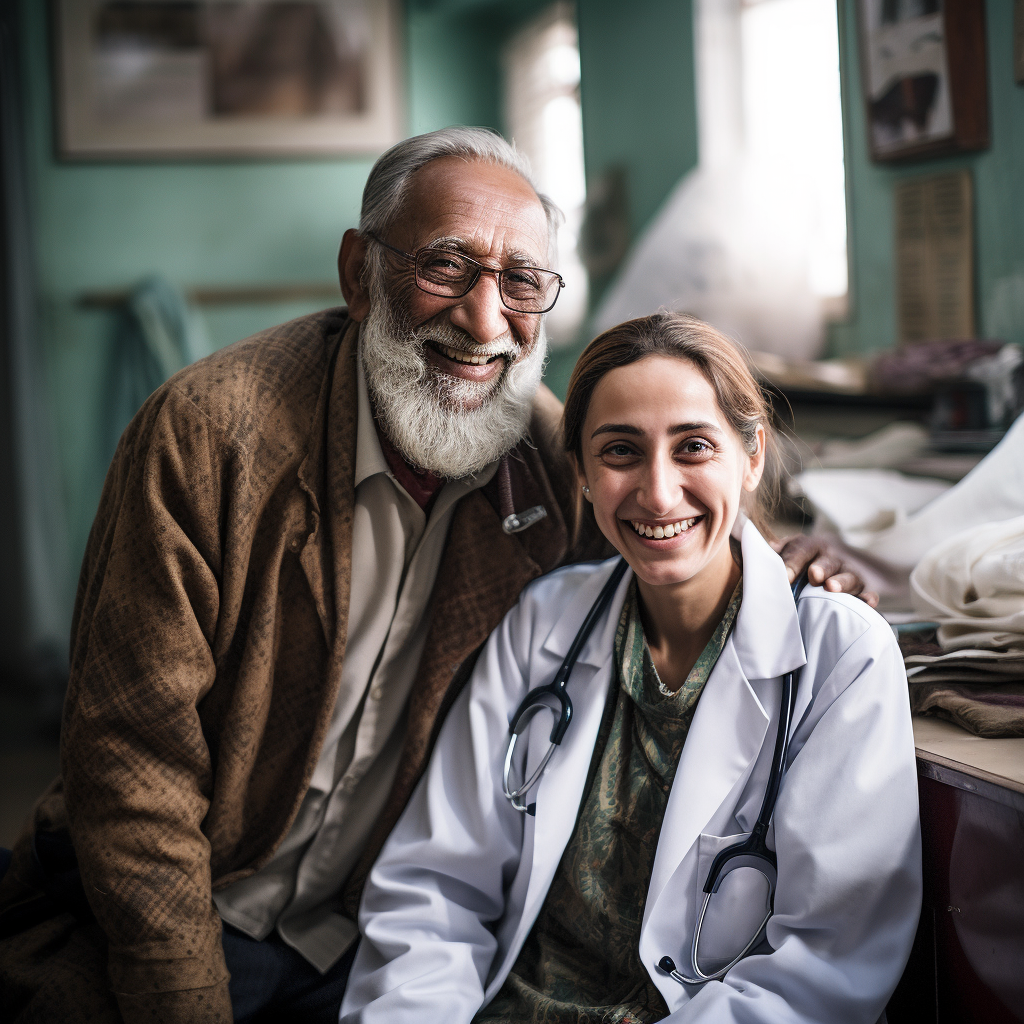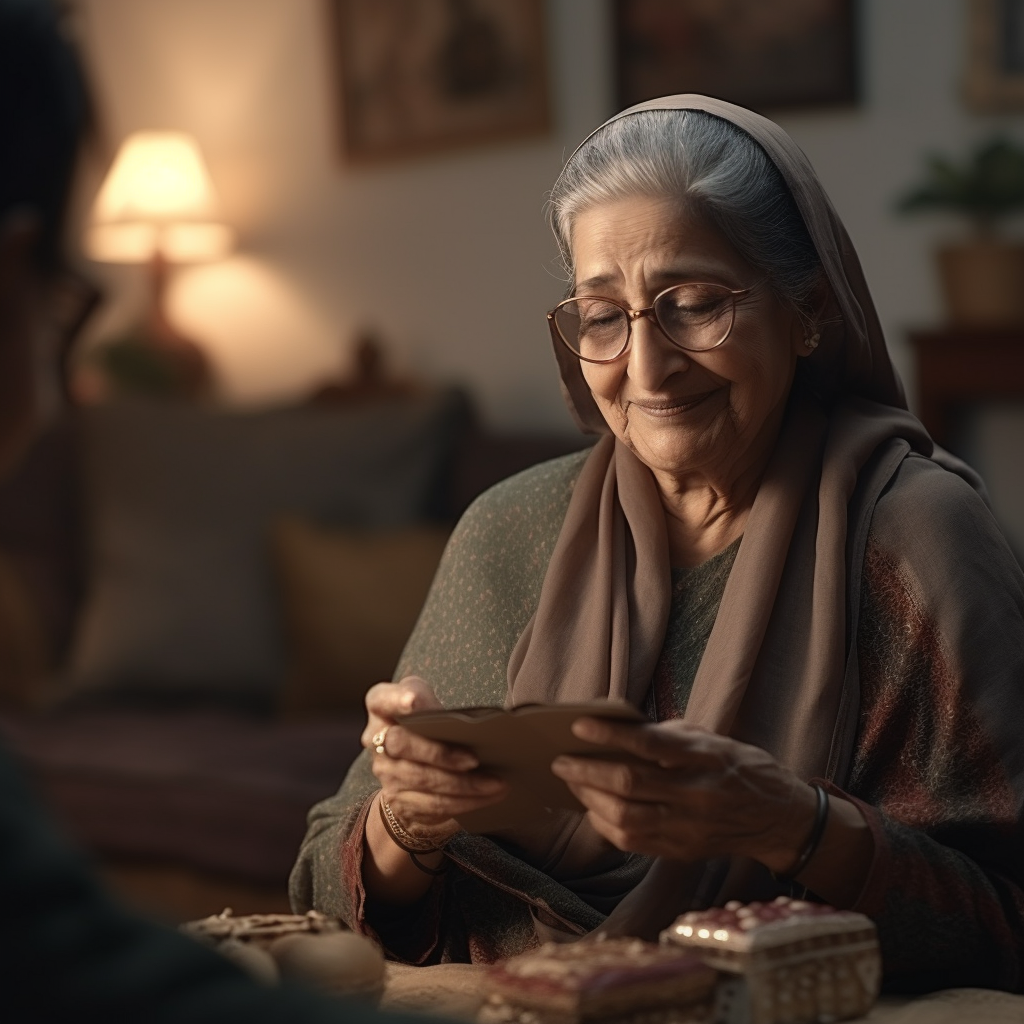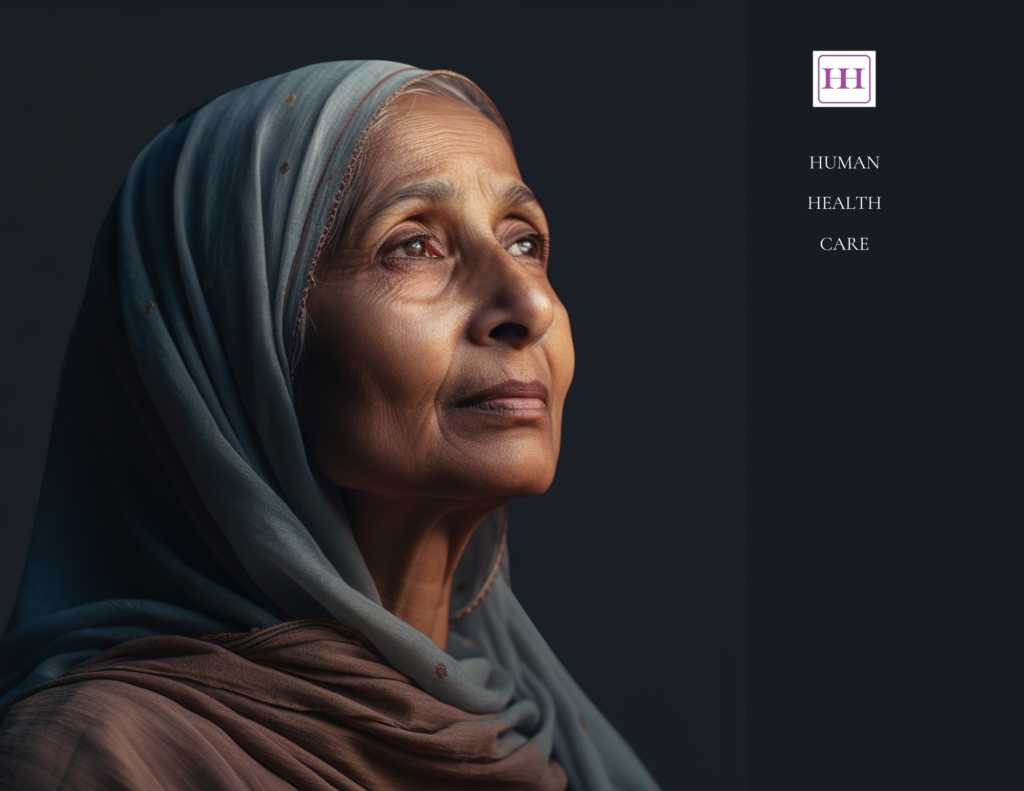As the population in Karachi continues to age, the demand for comprehensive healthcare services for the elderly has become increasingly crucial. Pakistan’s elderly population (aged 60 and above) increased by 75.1% between 1990 and 2010, and is projected to double to 11% of the total population by 2025.
According to the census data, the proportion of Pakistanis aged 60 and above has risen from 6.8% in 1998 to 8.2% in 2017, with Karachi being home to a significant number of these older adults.
The Challenges our Parents & Elderly Pakistanis Face Today

The public healthcare system in Pakistan is underfunded and overburdened, leading to long waiting times and subpar services. Traditional models of care, where elderly patients must navigate the challenges of traveling to clinics or hospitals, often fall short in meeting the unique needs of this vulnerable group.
Moreover, there is shortage of specialized geriatric care providers as well. This can make it difficult for the elderly to receive the personalized attention and comprehensive services they require.
However, a growing body of research highlights the transformative potential of home visits for elderly patients in Karachi, offering a more holistic and patient-centric approach to healthcare delivery.
While the majority of elderly patients receive care from their immediate family members, a significant proportion of caregivers face difficulties in providing care, such as lack of time, being miles away from parents being a few.
Elderly patients may feel lonely and disconnected from their families and communities, which can have a detrimental impact on their mental and emotional well-being. Factors like the loss of a spouse, migration of children for work, and declining health can contribute to social isolation among the elderly.
A study published in the Pakistan Journal of Public Health found that 93% of the 400 elderly participants were not willing to live in old-age homes, with the main reason being a desire to stay with family. Another study published in the NCBI found that 70% of the 400 elderly participants stated that the care provided by their caregivers at home improved their quality of life.
The most common medical conditions that elderly patients in Karachi face are:
- Cardiovascular Diseases: Cardiovascular diseases, including heart disease and stroke, are the leading cause of mortality and morbidity among the elderly in Pakistan
- Diabetes: Diabetes is another common chronic disease affecting seniors in Pakistan
- Chronic Respiratory Diseases: Chronic respiratory diseases, including Chronic Obstructive Pulmonary Disease (COPD) and asthma, are common among seniors in Pakistan
- Arthritis: Arthritis, particularly osteoarthritis and rheumatoid arthritis, is common among seniors in Pakistan
- Neurological Disorders: The most common diagnoses among the elderly in Karachi were neurological disorders, including cerebrovascular accidents (strokes)
- Gastrointestinal Disorders: Gastrointestinal disorders were also among the most common diagnoses among the elderly in Karachi.
- Depression: A study found that 40.6% of the elderly in Karachi were suffering from probable depression, with a higher prevalence in women.

How To Solve Health Care Problems for Our Parents
Fortunately, home visits have emerged as a valuable solution to address the healthcare needs of the aging population in Karachi. By bringing medical services directly to the patient’s doorstep, home visits can provide a range of benefits, including improved access to care, enhanced patient satisfaction, and better health outcomes.
This comprehensive guide will explore the various advantages of home visits for elderly patients in Karachi, drawing insights from the latest research and best practices in geriatric care.
By understanding the potential of this innovative approach, healthcare providers and policymakers can work to enhance the delivery of care and improve the overall well-being of Karachi’s aging population.
Enhancing Convenience
Home visits drastically improve accessibility for elderly patients who struggle with mobility and transportation challenges. This service ensures that every senior citizen in Karachi can receive timely medical attention without the physical and financial burden of traveling.
By delivering care directly to their living spaces, these visits not only enhance convenience but also increase the efficiency of healthcare delivery, reducing the strain on overburdened public health facilities.
Improved Access to Care
One of the primary advantages of home visits for elderly patients in Karachi is the enhanced accessibility to healthcare services. Many older adults in the city face mobility challenges, limited transportation options, or financial constraints that make it difficult to regularly visit healthcare facilities.
Moreover, with inflation on the rise, children of elderly parents are extremely busy on their jobs. By bringing medical professionals directly to the patient’s doorstep, home visits eliminate these barriers and ensure that even the most vulnerable elderly individuals can receive the care they need.
Personalized and Focused Care
Home visits also allow doctors, nurses and allied health care providers to gain a deeper understanding of the patient’s living environment, daily routines, and overall well-being.
This intimate knowledge enables them to tailor their care plans to the specific needs and preferences of the elderly individual, addressing not only their medical concerns but also their emotional, social, and functional requirements.
In the comfort of their own homes, patients can communicate more freely, allowing doctors to better understand their health conditions and personal circumstances.
Just as cricket and soccer teams often perform better on their home turf, benefiting from familiar surroundings and supportive fans, elderly patients can experience similar advantages when receiving medical care at home. In the comfort of their own environment, patients are likely to be more relaxed and receptive, allowing for better communication and more personalized care.
This “home ground advantage” not only enhances patient comfort but also allows doctors to make more informed assessments by observing the patient’s living conditions. Such personalized care can lead to more effective management of chronic conditions and overall better health outcomes.
This home setting enables healthcare providers to tailor their treatments to the specific needs of each patient, which is particularly beneficial for managing chronic conditions common among the elderly.
Preventive Care and Early Detection
Regular home visits provide a framework for preventive care, which is crucial for the elderly to maintain their health and prevent the progression of diseases. Healthcare providers can monitor vital signs, manage medications, and observe changes in health conditions more effectively, leading to early detection of potential health issues. This proactive approach can significantly reduce the likelihood of emergency hospital visits and severe health complications.
Enhanced Patient Satisfaction and Outcomes
Studies have shown that elderly patients who receive home-based care often experience higher levels of satisfaction with their healthcare services. 70% of the 400 elderly participants in one study stated that the care provided by their caregivers at home improved their quality of life.
The comfort and familiarity of the home environment, combined with the personalized attention of the healthcare team, can lead to improved patient engagement, better adherence to treatment plans, and ultimately, better health outcomes.
Reducing Hospital Readmissions
Home visits have been shown to reduce hospital readmissions, a common concern among the elderly population who often suffer from multiple health issues. By providing continuous, comprehensive care at home especially utilizing remote monitoring tools, medical professionals can effectively manage post-discharge recovery and complications.
This not only improves the quality of life for the elderly but also eases the burden on the city’s healthcare infrastructure and reducing hospital bed demand.
Supporting Mental and Emotional Well-being
The psychological benefits of home visits are profound. Elderly patients receiving care in their familiar environment experience less stress and anxiety compared to those who visit hospitals frequently.
This comfort can lead to better mental health and increased satisfaction with the healthcare provided. Additionally, home visits allow healthcare providers to assess the living conditions of the elderly, which can be crucial in understanding and managing their overall well-being.
Reduced Burden on Caregivers
For many elderly individuals in Karachi, the responsibility of caregiving falls on family members, who often struggle to balance their own work and personal commitments with the demands of caring for an aging loved one.
Home visits can alleviate this burden by providing professional support and respite for caregivers, allowing them to focus on their own well-being while ensuring their elderly family member receives the care they need.
At Human-Healthcare.com, most of our clients are overseas Pakistanis who feel guilty for being far away from their parents. Although they feel privileged that they can afford expensive health service, these professional Pakistanis do feel stressed that they are living miles away from their parents at a time when their frail parents need them the most.
Human-Healthcare.com fills that gap for them. Not only taking care of their parents health but also reducing the stress and mental burden many overseas Pakistanis have traditionally faced with no solution in sight. But now they have a partner, a startup that solves this problem.
Addressing the Unique Challenges of Karachi
Karachi’s densely populated urban landscape, coupled with its diverse socioeconomic and cultural landscape, presents unique challenges for the delivery of healthcare services to the elderly. The city has become a traffic jungle, chaotic and angry.
Not only that with fuel prices being sky high, making a trip to a doctor often costs same in fuel charges than the doctor fees. Plus, the stress elderly people have on the road, challenges with toileting in the waiting area or en-route, being some of the concerns.
Home visits can help to overcome these obstacles by providing a flexible and adaptable model of care that can be tailored to the specific needs of each community and individual.
Cost-Effectiveness
While the initial cost and subscription costs of setting up home care services might seem high, the long-term savings are significant. By preventing hospital readmissions and reducing the need for emergency care, home visits can be a cost-effective solution for both families and healthcare systems. Moreover, they allow for the optimal allocation of resources, ensuring that healthcare facilities are available for more critical cases.

Training and Challenges
To implement a successful home visit program, it is essential to train healthcare providers in geriatric care and home healthcare strategies. This includes navigating the unique challenges of home-based care, such as dealing with different home environments and coordinating with family members. Furthermore, there are logistical and infrastructural challenges that need to be addressed to scale these services across Karachi effectively.
Human-Healthcare.com is the first Health @Home program in Pakistan, launched by Pakistani, American, Canadian and UK based doctors. Focusing on parents of overseas Pakistanis, the startup is re-inventing the healthcare system in Pakistan by disrupting traditional health system.

Conclusion
The potential of home visits to transform the delivery of healthcare for elderly patients in Karachi is undeniable. By addressing the unique challenges faced by this population, home-based care can improve access to services, enhance patient satisfaction and outcomes, and reduce the burden on caregivers and the healthcare system as a whole. As Karachi continues to grapple with the growing needs of its aging population, embracing the power of home visits can be a crucial step in ensuring that every elderly individual in the city receives the compassionate and comprehensive care they deserve.
If you have a parent or elderly who you are hoping to provide world-class health@home service, Human-Healthcare.com may be the the answer to your prayers. Visit www.Human-Healthcare.com to learn more. Or send an email to Atif@human-healthcare.com to learn how we can provide VIP healthcare to your parents in Karachi, Pakistan.
Reference:
- https://digital.ahrq.gov/health-it-tools-and-resources/evaluation-resources/health-it-survey-compendium/eldertree-baseline
- https://bmcpsychiatry.biomedcentral.com/articles/10.1186/1471-244X-13-181
- https://www.researchgate.net/publication/257770797_Aging_and_Elderly_in_Pakistan
- https://ecommons.aku.edu/cgi/viewcontent.cgi?article=1068&context=pakistan_fhs_mc_fam_med
- https://www.academia.edu/1854670/Aging_and_Elderly_in_Pakistan
- https://cbs.lums.edu.pk/student-research-series/rehabilitating-pakistans-elderly-population-ever-increasing-issues-old-age
